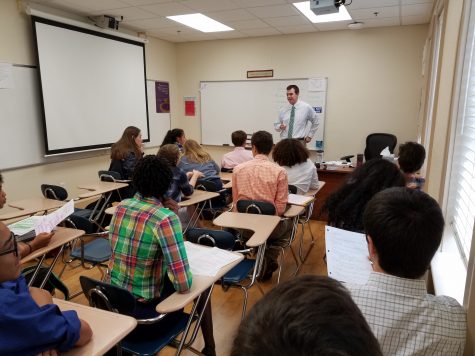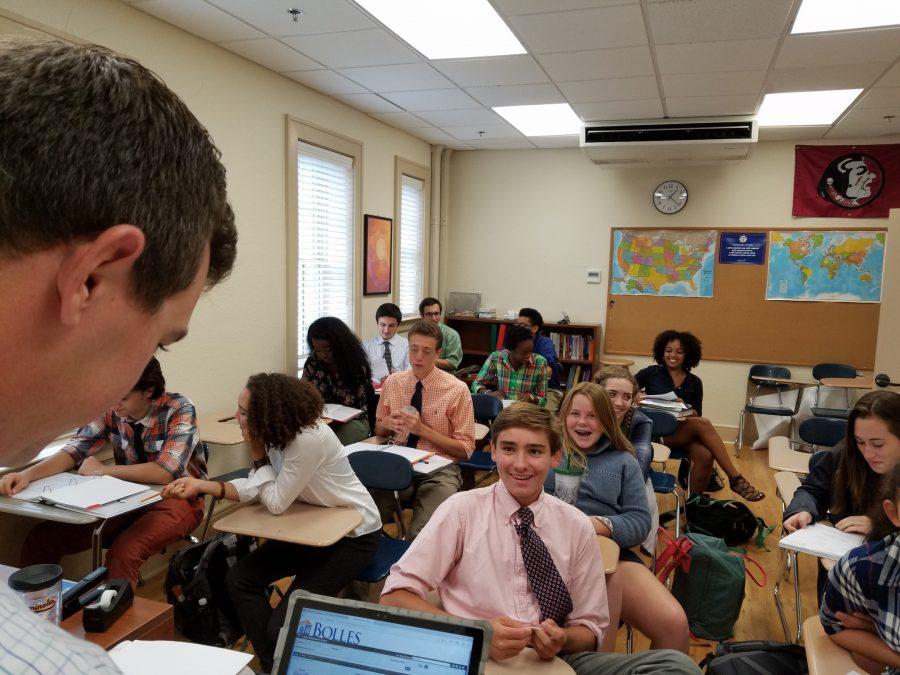Bolles Offers New Elective: World Religions
September 19, 2016
 World Religions, a new elective introduced this year, focuses on the various religions in the world, what they have in common, how they differ, and the impact they have on our World. Mark Brown and eighteen students are pioneers in the course.
World Religions, a new elective introduced this year, focuses on the various religions in the world, what they have in common, how they differ, and the impact they have on our World. Mark Brown and eighteen students are pioneers in the course.
Founder and teacher, Mark Brown believes that, “diversity expands perspectives.” Addressing the need for the school to enhance perspectives on diversity was his motive for starting the World Religions class. He feels that the community has a, “general intrigue about religion.” Brown plans to cover the “Major Five” in depth throughout the year. The five most common religions, or “Major Five” are Christianity, Islam, Hinduism, Buddhism, and Judaism. Brown will teach history, values, practices, core belief systems, and compare all five.
And as religion in America becomes increasingly diverse, knowledge and enriched understanding of religion is important because it teaches tolerance and open-mindedness. “Knowledge is the most empowering characteristic, by gaining it people can better themselves. This class is the stage for people to gain that knowledge”, says Brown.
Especially in the 21st century, Brown sees knowing the truth a beneficial skill. “With global affairs and religion constantly in the news, the class allows students to sift through the truth.” Brown claims the media always has an angle on religion and that students should be able to pick up on it.
Alex Cywes (‘19) is among the eighteen students. Cywes was motivated by religion’s commonplace in mainstream media, wanting a different perspective on religion. Since it has become a hot topic, he finds it to be a “valuable skill-set”. Another student, Hollin Hakimian was motivated to learn about her father, an Iranian Muslim’s, faith. “I wanted to be able to be knowledgeable in the Muslim religion, as well as others, so that I will be able to have a better perspective and understanding for other religious people.”
Cywes particularly likes learning the three aspects behind all religions: theoretical, practical, and sociological. Theoretical involves belief, practical involves physical and spiritual practice of faith, and sociological deals with the hierarchy. Hakimian was fascinated when taught about how millennials are embracing spirituality, not religion.
In addition to the straight facts, Brown also incorporates student input reflection. After studying a new concept, he “offers an opportunity to reflect and have a bit more personal investment in expanding interest.”
Students are prompted to compare their belief systems and create civil dialogue about faith. Mr. Brown reasons that, “letting the students direct the conversation allows it to be more authentic.” Cywes says, “I like how he [Brown] makes sure everyone’s voice is heard”.
Hollin agrees, “ I like Mr. Brown’s teaching method because we are able to discuss and reflect our thoughts on various topics. “
Because faith is such an opinionated topic, Brown also makes sure not to, “push his beliefs”. Cywes says, “He gives shy students a chance to speak their mind. He is careful not to offend anyone and lets his students know that nobody is wrong in their belief.”
Overall, Brown is, “expecting good things as we continue to progress.”







